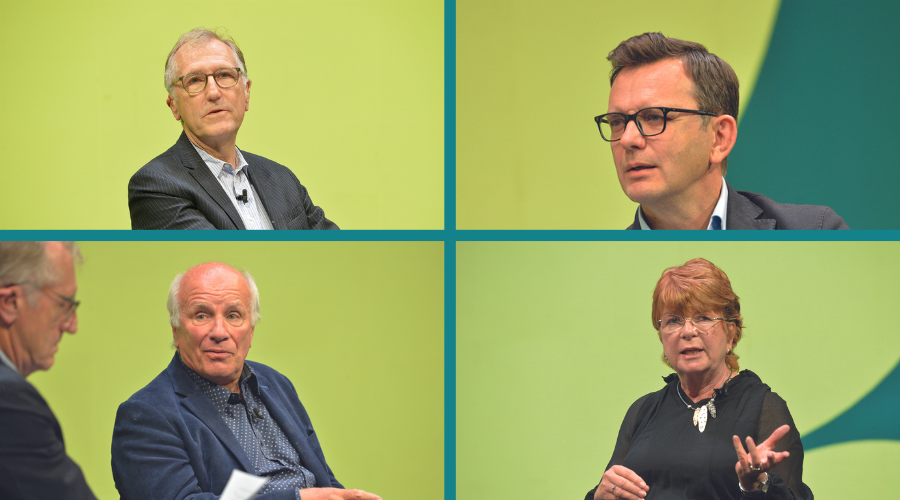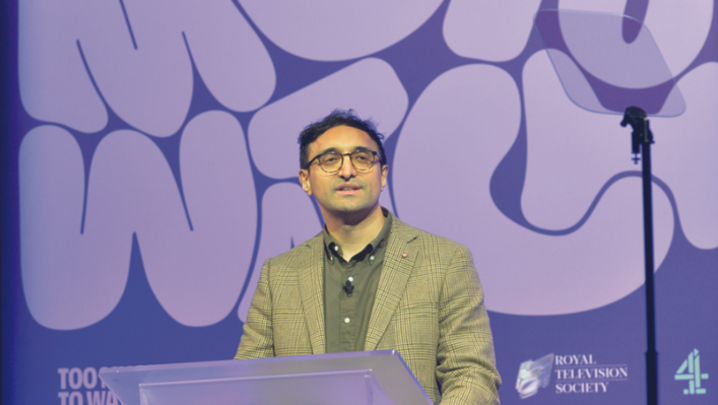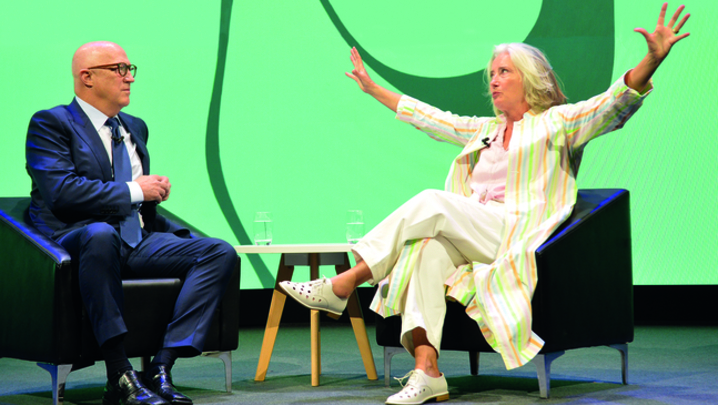Three crisis managers bring their experience to an evolving scenario involving a TV celebrity
As the allegations against Russell Brand circled the broadcasters gathered at Cambridge, there was particular interest in this session about – as the panel chair, John Gapper, put it with an ironic smile – “the incredibly unlikely situation” in which a media crisis erupts involving a well-known TV figure.
Saying as little as possible seemed to be the best way to deal with a crisis, according to the panel of three experienced crisis managers: former BBC DG Greg Dyke, lawyer Caroline Kean and ex-News of the World editor and Downing Street adviser turned communications consultant Andy Coulson.
The trio were presented with a fictional scenario involving a judge called Alice on talent show Starmaker. They were asked to roleplay how the show’s producer, the broadcaster’s lawyer and the show’s press team would respond. It began with Alice telling producers she wanted to miss the live final as her teenage daughter was in hospital because of a mental health crisis.
Alice had missed a pre-recorded show before because of her daughter, with the press office releasing a statement at the time stating that one of her children was unwell. But things had escalated, and Alice wanted to protect her daughter’s privacy. Complicating matters was Alice’s alcohol problem.
Giving the thoughts of the broadcaster’s lawyer, Kean laid out the privacy issues. As Alice’s daughter is 17, she is still a minor. A number of the codes set by press regulator IPSO refer to 16 as “the limit for intrusion”, but she would still be treated as a minor and, as an individual, “even if she is an adult, her mental health, her wellbeing, is a matter of the utmost privacy”.
The broadcaster had “a duty of care to Alice” and should “respect her trust... as well as balance the interests of the show and the other judges. But looking after her is the primary concern.”
Asked for the producer’s viewpoint, Dyke said what he would be thinking was: “If Alice is not going do the final, then who is?”
Gapper said a press announcement would have to be made. Coulson’s advice was to say “as little as possible”. It was a mistake that “the child was referenced” in the first statement: “I would... go with phrasing around private family issues, something along those lines.”
He added: “The other rule of statement-writing that I like to follow is, remove all drama.”
Gapper noted, however, that the drama was exactly what the media would highlight. “Of course, but you’re not in control of that. What you have got control of is your statement and that’s the golden rule during any kind of crisis. Work out what you do have control of and what you don’t, and concentrate on the things that you do,” advised Coulson.
Dyke said the broadcaster should announce the “new presenter at the same time – because that’s the bigger story”.
Coulson suggested that it was important to build trust between the media, the PR and Alice, and he would ask her: “What do you want?”
Gapper added a new conundrum to the mix: a journalist had rung the press office claiming that a production source had alleged that Alice was struggling with alcohol again.
Kean said she would be looking at any previous stories and interviews about Alice’s drinking to see if it “has been publicly discussed”. Dyke said it was unlikely the journalist would pursue the story having got it from just one source.
Coulson was asked by Dyke if he would have run such a story from a single source when he was editor of the News of the World. “No, you need to establish the facts,” said Coulson, adding it often then comes down to “relationships – who knows who, who can talk to who in a way that’s got some trust around it; [and involving] a journalist who understands what a background briefing or off-the-record statement is.”
If Coulson were representing Alice, he said, he would ask her: “What do you want to end up with? I imagine it would be: ‘I want my daughter to be protected.’” He said she might decide it would be better to have the stories about her drinking emerge if it meant her daughter was not mentioned.
The story was moved on by Gapper, who said Alice’s ex, with whom she had experienced a difficult divorce, had tweeted that “the chickens always come home to roost”. The panel agreed this was invading the daughter’s privacy.
There then ensued an amusing exchange between Gapper – playing Bill, one of Alice’s Starmaker co-judges and a long-term colleague of Dyke’s fictitious producer – exploiting their friendship to persuade him to reveal what was really going on.
The audience was given the chance to vote on whether Bill should be told, and agreed with Dyke that he should tell Bill only what had already been said publicly.
Gapper announced that the story continued to escalate, with the press looking for evidence of Alice’s drinking and Bill trying to veto her replacement, Helen – something Kean said he would not have a right to do unless it was in his contract.
Adding to the chaos, the ex-husband then gave a tabloid interview in which he alleged that producers turned a blind eye to Alice’s drinking during the filming of Starmaker.
"Work out what you don’t control, and concentrate on the things that you do"
“All they’ve got is an embittered ex-husband’s allegation,” said Dyke. Coulson agreed: “We’re forgetting here that the editor of this tabloid newspaper, if things have been handled properly, is aware that this is a pretty messy situation and children are involved…you’re guiding them away from creating a real problem for themselves.”
Kean said that, although the ex was “making libellous allegations about a professional production company”, she would not send “a lawyer’s letter” as this can make it look as though there is something to hide.
Further developments in the story included Alice wondering if she should go public with the story about her daughter, which Coulson and Dyke advised against. As Dyke noted wryly: “All stories go away in the end. Except a few... which we both know about.”
Kean pointed out that the daughter would be entitled to stop the story and that it would destroy her relationship with her mother.
Gapper put the final scenario to the panel: a journalist claimed to have pictures of Alice’s daughter in a private hospital and the name of the hospital had been posted on social media.
“No one’s going to publish that photo,” said Coulson, although he conceded that they might have 30 years ago. “Pre-1998, you might have run a story like that,” agreed Kean, but “now, with privacy laws”, Alice would be able to go for an injunction.
Dyke recalled that, after he left the BBC, there was a photo in a newspaper of him on holiday on an inflatable banana with his children: “I got the press office to ring them up and say: ‘You can’t do that, they’re my kids.’ They said: ‘We didn’t know they were his kids.’ To which I said: ‘Well, I wasn’t going to go and sit on a banana with [just] anybody’s kids!’ But, legally, they could’ve run that until 1998.”
Gapper wrapped up the session with a happy ending for all, including Alice moving on to make a documentary about teenage mental health.
Session Fourteen of the Too Much To Watch convention, ‘Crisis = danger + opportunity’, was chaired by FT business columnist John Gapper. The panellists were Andy Coulson, founder, Coulson Partners; Greg Dyke, ex-BBC DG and CEO, LWT; and Caroline Kean, Consultant Partner, Wiggin LLP. The producers were Diana Muir, Lisa Campbell and ITN team.







